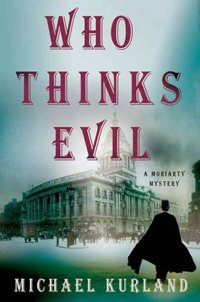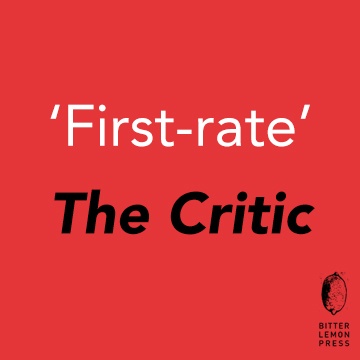Kurland’s Professor Moriarty series began in 1979 with The Infernal Device. It was an Edgar Award finalist and was also nominated for an American Book Award. Death by Gaslight, The Great Game, and The Empress of India followed. The series’ conceit is to tell stories from the point of view of ‘The Napoleon of Crime’, as Holmes insists on calling him. Moriarty is coerced, sometimes by circumstance, at others times by Holmes or his brother Mycroft, into doing good, often for the country. Now for the first time since 2006 Kurland is back with a new Moriarty novel.
The professor’s associates include the criminal Mummer Tolliver and the American reporter Benjamin Barnett, whose life he saved in The Infernal Machine. Moriarty is portrayed as an anti-hero, or indeed sometimes a hero, far cleverer than Holmes, whose repeated attempts to fool him with a disguise he never fails to see through, and whose dogged insistence that he is behind every crime in the capital Moriarty rejects half-heartedly. Crime is more an intellectual pursuit for Kurland’s protagonist, and is really only done if it represents a particular challenge and can fund his real interests in physics and astronomy.
Besides which, Moriarty would claim he is only behind those crimes which are well executed and successful. That certainly does not include the burglary of the country estate of His Lordship Baron Thornton-Hoxbary, which is unfortunate since Moriarty is currently on trial for what has become known as the Widdersign Outrage. His stay at Her Majesty’s pleasure doesn’t last long however as a madman has been butchering prostitutes in London’s more exclusive brothels in a manner which brings to mind the recent horrors of Jack the Ripper. The Ripper was never caught of course, and there has been all kinds of speculation as to his identity, including claims it was the dissolute grandson of Queen Victoria, Prince Albert Victor. Now Prince Albert was known to be a client of these establishments and was witnessed paying for the services of one of the victims. Worse still, he has disappeared without trace, and the government wants Moriarty to find the prince and clear his name if possible. The scandal, if it were discovered, could bring down the monarchy and throw Britain into chaos.
Moriarty is set free to begin his investigations, and needs all of his considerable resources to solve the case as the Prince, if it is him, continues his monstrous work. For Moriarty, there is also the personal matter of finding out who framed him for the Widdersign burglary.
The emphasis of these books is clearly on light-hearted entertainment. Kurland is skilled enough in his depiction of his characters – particularly the witty, aloof Moriarty and the reporter Barnett’s formidable wife Cecily. If there’s something missing, it’s a foil for Moriarty. Holmes has Watson, but here Moriarty has henchmen but no companion. Kim Newman’s Moriarty novel, The Hound of the D’Urbevilles , takes a similar approach to Kurland’s work but benefits from having Colonel Sebastian Moran as narrator. Kurland’s Moriarty is almost too omniscient and might appear more human if viewed through the lens of a third party.
The author does show a deft comic touch in his presentation of Holmes as an arrogant meddler, not half as clever as he thinks he is. The pace of these stories is kept up throughout, and Kurland even finds space to make some observations about social class and privilege in 19th century London. Who Thinks Evil and The Infernal Machine are available now with Titan Books publishing the rest in the series through the spring.
Titan Books
Print/Kindle/iBook
£5.87
CFL Rating: 3 Stars











